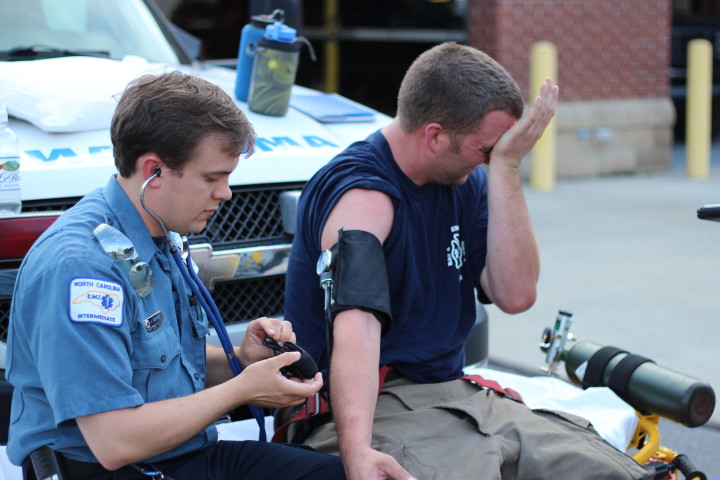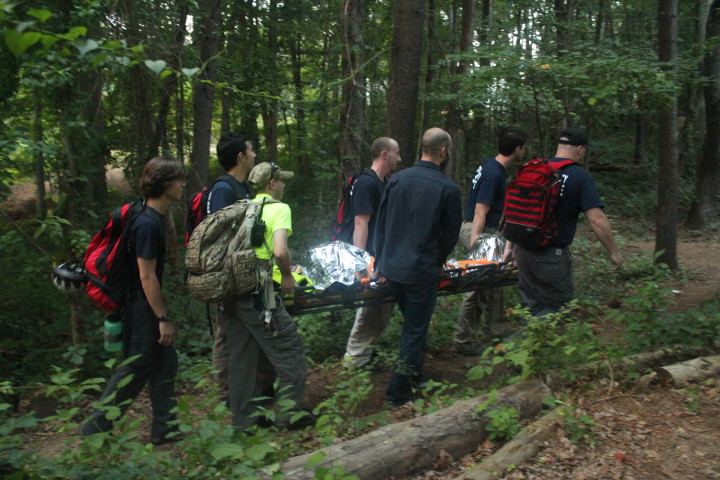Hours after he was supposed to show up, a bicyclist has been reported missing. His last known whereabouts were the trails at the Kolo Bike Park, but that plus a basic description is all that the Buncombe County Rescue Squad volunteers know before setting out on this staged drill.
Carrying bags of gear that typically weigh 30 to 35 pounds, the squad splits into two groups. Volunteers set off on a predetermined search route, eventually finding his bike tangled around a tree and the man lying in the trail with obvious signs of trauma.
The volunteers work efficiently to clean him up, dress his wounds, splint him and load him on a transport board so they can remove him from the woods. Then a squad member falls and twists his ankle. Now there are two victims.
“We like to keep them on their toes,” says Deputy Chief Nathan “Phoenix” Smith.
Over 50 years of history
The rescue squad was founded in 1962 after concerned neighbors banded together to search for a young boy who’d ridden off on his new bike and hadn’t come back.
“After they found him unharmed, they decided that there really needed to be a group responsible for responding to things like this, so they got together as an all-volunteer agency,” Smith explains.
Over time the group added skills such as rope rescue and heavy rescue — including vehicle extrication, water rescue and dive teams — to its bag of tricks but then scaled back as other local agencies gained those same capabilities.
“We kind of downsized and just focused on the things that we, as a very small organization with limited funding, could continue to maintain,” says Smith.
The private nonprofit is supported mostly by revenue from transporting patients, plus donations and fundraising efforts. The Search and Rescue Division has 30 volunteers, and there are roughly 25 paid staffers.
“Our paid staff is exclusively medical,” Smith says. “Nobody charges for search and rescue; therefore we need to staff our rescue teams with volunteers. We do generate revenue running medical calls: That’s the part of the business we can afford to pay people for, since it’s paying for itself.”
Dead vehicle
Until recently, the EMS Division had four ambulances. Three would run daily, divided between 911 response and convalescent transport (mainly discharge contracts with Mission Hospital); the fourth was a backup.
On July 7, however, a crew was transporting a patient when the driver smelled smoke and melting plastic. The crew called for another unit to take charge of the patient — and then the power steering and brakes began to fail. By locking the transmission in low gear, the driver was able to safely stop by the side of the road, and both crew and patient were evacuated. But extensive fire damage to the engine and main cab meant the ambulance was totaled.
That’s a problem, because any vehicle needing routine maintenance or repairs leaves the county short an ambulance and temporarily puts employees out of work.
“Our insurance will be able to cover a significant portion of the cost; however, we are still about $30,000 short,” says Smith. So the squad applied for a Janirve Sudden or Urgent Needs Grant through The Community Foundation of WNC. On Aug. 11, The Community Foundation announced it had awarded a grant that “will close the gap between the cost and the insurance reimbursement.”
The EMS Division operates Monday through Saturday and also provides medical coverage for special events ranging from UNC Asheville basketball to roller derby matches and marathons.
A few weeks before the search and rescue drill, the EMS Division did a different kind of training, standing by while firefighters in Swannanoa practiced on a burning building.

“Anytime they have a structure fire and have multiple departments responding, they’ll call for us to basically come and check the Fire Department personnel,” EMS Lt. Beckett Arnold explains. “Our primary role is support for them, and then if anybody gets hurt, we can also do initial treatments until a paramedic truck can get to them. We check their vital signs, check their air, make sure they’re not overexerting themselves and keep them safe. So we do quite a bit.”
Intensive training
The Rescue Division’s focus is on wilderness rescue, search and rescue, and low-angle rope tactics used to extract injured people from steep places. And though no special skills are required to volunteer for the squad, new recruits are expected to pursue additional training. North Carolina’s technical rescuer certification includes several different specialties, and volunteers are encouraged to pick one.
“As a rescue agency, we’re expected to have our personnel trained at those standards,” notes Smith. “There’s also NASAR — a private entity considered to be one of the standards when it comes to search and rescue training — so we encourage as many of our members as possible to go through that as well.”
When a request for assistance comes in, it takes about an hour for members to leave work, gather up their gear and assemble before the team rolls out of the station. After checking in with the incident command staff and getting a profile of the missing person, they divide into teams and start the search. By that time, quick searches for clues along the easy trails have generally already been conducted.
“Once it gets to that point where we start going off-trail, that’s really where our teams tend to excel,” says Smith. “We’re not shy to get down to the bushwhacking, scaling up mountains and all that kind of stuff.
“Typically, by the time a search gets big enough to where help has been called for, it’s been going on for several hours — it’s getting dark, and local resources have already been expended,” he continues. “So the majority of our searches have been all night long. We’re looking at starting at 11 or 12 at night and not finishing until 6 or 7 in the morning. It’s not that those are the preferred times to search; it’s just those are the times when we’ve been called in.”
Night searches, though, are significantly more dangerous. Visibility is limited, making navigation trickier and natural hazards such as steep drop-offs harder to spot. How do you use a map and compass accurately when you can see only as far as your flashlight beam extends?
“We happen to be good at that, because we train that way as well,” says Smith. “A lot of our search exercises are conducted at night. There are a lot of challenges that, unless you’ve prepared for them, your team can be compromised; your safety can be compromised. So we tailor our training accordingly.”
There are weekly training sessions and, at least once per quarter, an all-day rescue training to help members stay in sync with changing seasons and weather conditions.
Ever ready
Not a lot of searches originate in Buncombe County, where the trails are mostly well-marked and tend to be more heavily used. So when the squad is called in, it’s typically for somewhere outside the county.
“What’s tricky about that is we have to make sure we stay on our game and get prepared for that more difficult terrain,” Smith explains. “The walk in the park, quite literally, requires much less training and upkeep, but we can’t afford to get complacent. We have to make sure we’re keeping our skills at that level where we can do a 12-hour overnight run through Shining Rock.”
Thanks to the growing number of cellphone towers, rescue squads are generally getting fewer calls these days. Incident commanders can often contact lost people and guide them out by phone. But that doesn’t mean these guys are taking it easy — because when they do get a call, it’s likely to be difficult.
The most intense rescue operation Smith remembers involved a woman who’d gone bushwhacking and camping in the Shining Rock Wilderness and gotten lost. She called a friend and said she couldn’t find her way back to the trail. Embarrassed, she reluctantly let her friend call for help.
“It was the one time I was present that we ended up having to evacuate our patient via helicopter,” Smith recalls. “The state sent in the helicopter and aquatic rescue team and evacuated the patient with a Blackhawk. That was also the first mission, and so far the only mission, that I had the opportunity to fly in the Highway Patrol helicopter prior to being deployed.
“They had just spotted smoke from her campfire,” he continues, “so they put me up in their bird and did a circle around where she was, so I could get an idea of the terrain and take that back to my team. Conveniently, also, I was running my GPS as we circled her location, so as we were navigating in later, I knew exactly where we were going.”
Still, actually getting in and retrieving her wasn’t so easy. The squad had to push through extremely challenging terrain to make the rescue.
“It was some of the most brutal bushwhacking we’ve ever had to do,” Smith recalls. “We were punching, kicking and head-butting our way, because we essentially had to bushwhack up a stream. When we finally made contact with her, I think we were all very close to hitting our physical breaking point. She was in great shape, good spirits, but had no idea where she was and didn’t have a map with her.”
Nonetheless, there was some concern about hypothermia, and meanwhile, some members of one of the other teams were in bad shape after the difficult trek, so most of them were evacuated by helicopter as well. Smith’s team, however, was left to slog back out, despite being utterly exhausted.
“That was the most physically demanding — but it was also the most rewarding in a lot of ways,” he concludes.
Be smart, be safe
As challenging, stressful and strenuous as the work often is, Smith loves working with the rescue squad.
“The most rewarding thing about it is being able to take both newly trained and untrained individuals and help them along their path toward becoming skilled EMTs and rescue technicians,” he says. “Whether their focus is emergency medicine or search and rescue, it’s a very fulfilling experience to be able to assist people who are interested in serving their community as they grow and gain experience.”

As for that lost hiker, he continues, the smartest thing she did was to stay where she was and wait for help to arrive. Smith urges anyone going hiking to carry a good-quality trail map — and always, always tell a friend where you’re going and when you expect to be back, so [that person] can point a search team in the right direction, if need be.
“When you’re lost, stay put and let us come to you,” he advises. “And anytime you’re going into the woods, be honest with yourself about your skill level. Don’t take on more than you can realistically get yourself out of.”
To volunteer, visit buncomberescue.org and fill out the volunteer application packet, or email info@buncomberescue.org..



Before you comment
The comments section is here to provide a platform for civil dialogue on the issues we face together as a local community. Xpress is committed to offering this platform for all voices, but when the tone of the discussion gets nasty or strays off topic, we believe many people choose not to participate. Xpress editors are determined to moderate comments to ensure a constructive interchange is maintained. All comments judged not to be in keeping with the spirit of civil discourse will be removed and repeat violators will be banned. See here for our terms of service. Thank you for being part of this effort to promote respectful discussion.